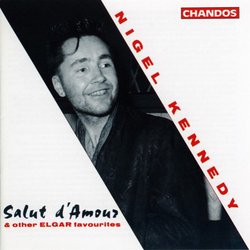NOSTALGIA IS NOT WHAT IT WAS
DAVID BRYSON | Glossop Derbyshire England | 11/30/2003
(5 out of 5 stars)
"A word in favour of this disc might not be out of place. It falls into two distinct parts, the violin sonata on the one hand and the ragbag of smaller pieces on the other. What `understanding' of Elgar I can lay claim to is not something I should try to assess, but his music has a powerful appeal for me and, for what it's worth, I have been trying all my life to get a deeper appreciation of his very unstraightforward personality. Elgar was rarely at peace with himself or with the world. I find in his music a mixture of nobility and neurosis which gives him an unlikely affinity with Mahler to that extent. The violin sonata is one of the three late and very personal pieces of chamber music that he produced, along with the string quartet and the piano quintet, the same `trio' of works that Franck turned out for the chamber repertory. It does not seem to me quite the equal of the other two, particularly the quintet, but it is a major effort all the same. Behind the lyricism it's not hard to detect the inner unease and melancholy, and the trick his interpreters have to turn is to be sensitive and responsive to the unpredictable twists of the composer's moods. The struggle must not be ironed out, but it must not overwhelm the contemplative element either, and to my ears Kennedy makes a very good show of it indeed. There is a deep frustration in the piece, something beating at the walls and door to be let out and then abandoning the effort, and I caught that sense quite strongly in this reading. The smaller pieces are Elgar letting his sentimental side out without complications. Elgar died in 1934, but in the late 40's and the 50's in Britain the kind of tea-houses still flourished that were the natural home of music like this. In my own native city I recall Miss Cranston's and Miss Buick's - children were required to be especially on their best behaviour as the tea was served with buttered toast, saggy sandwiches and nondescript little cakes arranged on odd little folding multi-deck tables. In the background there were hard-up-looking musicians playing tasteful airs, and I would be surprised if I did not make my first acquaintance with Salut d'Amour and Sospiri in one of these now-forgotten establishments. This disc does not so much lead me down memory lane as drag me down it forcibly. I mean this in the very best sense - the forcefulness is in the recollections, not some inappropriate emphasis in the playing. Kennedy is recorded rather close-to, but I can live with that. Peter Pettinger seems admirable to me throughout. I heard him in person many years ago, and remember him largely for chewing gum as he played, but I have not been aware of him in a long time. Steven Isserlis is well known of course, and provides a fine soulful partnership to Kennedy in Salut d'Amour. In the UK this serves as the title of the disc, gloriously misprinted as Salt d'Amour which I hope they never change. The recorded sound is really very good, and you will have gathered that this is a record that has quite a lot to say to me. For all I know this may be a minority opinion, but actually I should be surprised if these accounts are not thoroughly attractive to many. The era they recall is not one I greatly regret, but distance still lends enchantment to the view."
Wonderful music beautifully played
dm | rochester, ny | 11/23/2004
(5 out of 5 stars)
"The "lighter" pieces on this CD are very beautiful, and played wonderfully by Kennedy. This is certainly not what you expect from seeing his picture on the cover, they seem to want to make him the "punk rocker of classical."
The sonata is especially good, and more deeper and intense than the previous selections. Kennedy's playing is excellent on this CD."
Powerful
David Saemann | 03/17/2008
(5 out of 5 stars)
"This is one of Nigel Kennedy's earliest albums, from 1984. He already at that time was a complete artist. This is violin playing of the highest caliber. In the shorter salon works, Kennedy plays with a sumptuousness of tone and emotional identification that is totally winning. One is reminded here of Fritz Kreisler's playing, which for all I know may have been an influence on Kennedy. In the Sonata, a late work, the thorniness of the writing is overcome with playing that is absolutely magnetic. The performance has power and brains aplenty. It makes me regret deeply that Kennedy has not recorded much chamber music. The sound engineering is glorious, too. This is a wonderful addition to anybody's Elgar collection."


 Track Listings (10) - Disc #1
Track Listings (10) - Disc #1